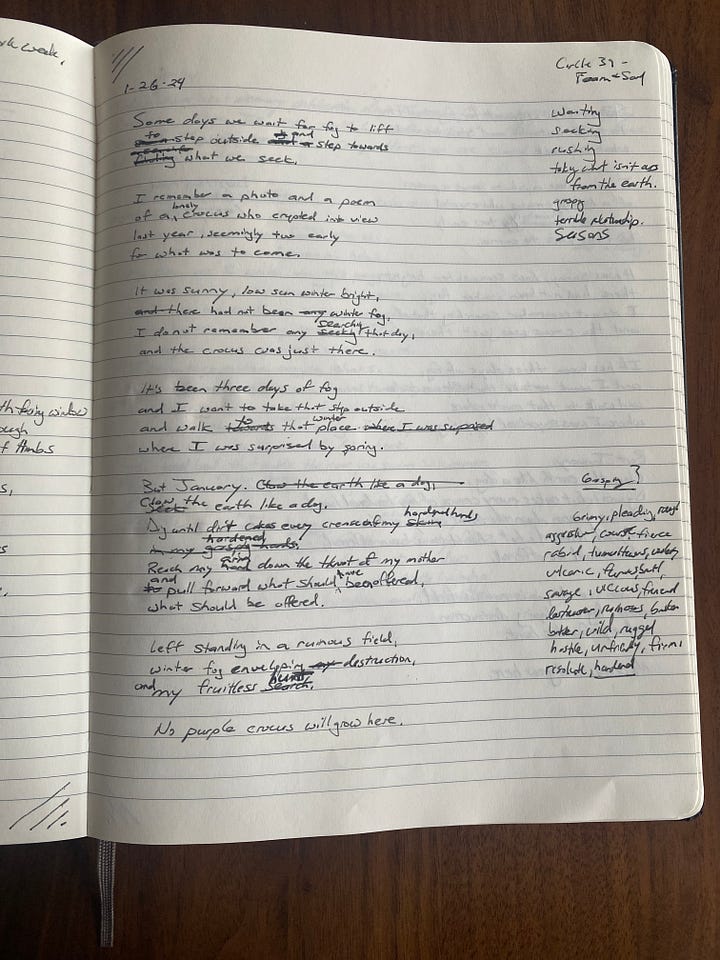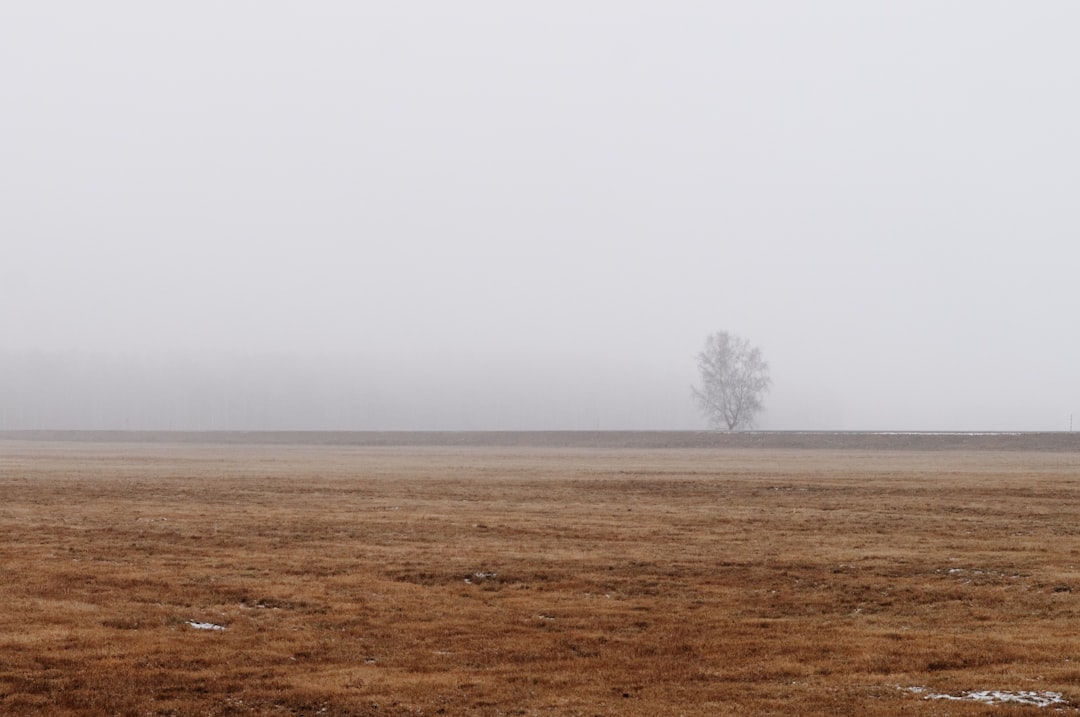The hunt: A reflection
Grasping, control, and grief
Spoken rendition of “The hunt”.
Process
I enjoy walking. Getting outside everyday for a stroll is crucial for me. Multiple times per day is even better. The dog certainly brings a necessity to walking as he seems happiest when he has worked some energy through his body and has let all his buddies know what he has seen that day. Beyond that, I walk from a desire for a more relaxed mindset, as it is a way to ease the anxiety that tries to frequently befriend me. Searching also leads me to walk, though I am often not sure for what. Sometimes it is a search for beauty, for understanding my place in nature, or for some sort of existential clarity, but it depends on the day.
In early 2023, after the calendar had flipped from January to February, I remember walking on a sunny morning with my dog and stumbling upon the first crocus that I had seen that spring. I was completely taken aback by this bright spot of color shimmering in the dawn light as I did not believe we were close enough to spring to see anything blooming. The flower seemed out of place, sitting in the patch of lawn between the sidewalk and the street and surrounded only by winter-dry grass. It was the first sign of spring to come and brought a massive amount of happiness to that day.
I intentionally walked that same route many times over the coming weeks to visit that spot of purple, anticipating what else would bloom. It took some time, but a few weeks later many dark purple shoots pushed their way through the soil, followed by the rapid change that spring brings. Why that one was ready to show off so early, who knows.
I used this experience to write a poem titled Promises that uses this memory as a loose story in the background. It was this poem that embedded this experience into my mind, and I brought it out this past winter to do some editing in preparation for sharing it with the world (to be published soon).
Perhaps doing the work to edit the piece in the middle of winter made me long for an early spring. Perhaps I was not willing to settle into the rhythm of rest that winter offers each year. Whatever the reason, in late January 2024, I felt as if I was in a fog, made especially poignant by the actual fog that lingered for three days during a warm winter spell. So, with an idea of what I needed in hand, I went in search of early spring signs, including a return to this specific spot to see an early crocus, as if three days of warmth was a sure-fire way to start the blooming cycle. I just wanted this season to be over and the next to appear.
As you might expect, when I arrived there was no bloom and not even a hint of the green shoots that precede the flower pushing through the dormant ground. I returned home, my mind transitioning from fog to dark, and I felt almost desperate, as if there was something I needed to coerce into being.
Over the next two days, The hunt was born. The poem was edited throughout the next month into what it is today.


The hunt
Some days we wait for fog to lift
to step outside and step towards
what we seek.
I remember a photo and a poem
of a lonely crocus who erupted into view
last year, stunningly too early
for what was to come.
It was sunny, low sun winter bright,
there had not been winter fog,
I do not remember searching that day,
and the crocus was just there.
It has been three days of fog
and I take that step outside
and walk to that winter place
where I was surprised by spring.
But January.
Claw the earth like a dog.
Dig until dirt cakes every crease of my hardened hands.
Reach my arm down the throat of my mother
and pull forward what should have been offered,
what should be offered.
I am standing in a ruinous field,
winter fog enveloping destruction
and my fruitless hunt.
No flower grows here.
Themes
When something beautiful arrives in our life, it is a reason to pause and celebrate. Taking time to embrace moments that are life-giving, whether a new relationship or an unexpected bloom, is a way to build a life of delight.
What we forget, or if we are truthful with ourselves, what we more often choose to ignore is that if anything is constant, it is change. Whether it is the relationship that will inevitably morph or the first spring flower petals that will fall to the earth, we may not be focused on the knowledge that the moment that we are enjoying will fade, but we know it somewhere in ourselves. It pushes us to begin conspiring about how we can force the season of beauty to stay, and when it begins to change, we strive to compress it back into the box it arrived in.
No matter the effort, change will occur. Our relationship to change is what impacts our relationship to what was and what is. When we reach back in time to bring a beautiful moment into the present, it often leaves us with a hollow feeling, even if the circumstance can somehow be recreated on a surface level. When a circumstance that feels so important to have again cannot be recreated, we may be found standing alone, accompanied only by despair.
If we learn to hold moments of delight with a light touch, it is training ground for how to hold difficult moments as well. When we despair, it is natural to want to banish the circumstance that brought the feeling to the ends of the earth so we never have to encounter it again. Once again, we would do well to remember that change is constant, and in the same way that moments of beauty fade, moments of pain transform into moments of beauty.
Grasping for what was and attempting to control what will be is an equation that results in present moment suffering.
While grasping and control were the planned themes of this poem, grief decided to show up and drip slowly between the lines in this poem. I sense it spill onto the first four stanzas, though not through a specific word or one particular phrase. Grief then pools throughout the last three stanzas, as the pace of the poem picks up through the frantic images of clawing at the ground, digging, and reaching down into mother earth to find the taste of hope the poet so desperately wants. When the writer stands and acknowledges that not only is the moment they desired not here, but that they have brought destruction through their acts of grasping and control, we are left with an image of isolation and a feeling of sinking. Whatever flower was poised to arrive within a few weeks has likely now been destroyed.
While this poem uses the image of a search for spring, consider what picture in your life this applies to. Perhaps it is a different type of relationship with a parent, in which case this poem is especially poignant. Perhaps it is a physical ailment that you desperately wish would disappear. It could be a career that you urgently want to move into but are not sure how to take a step towards it. Take this theme which is open for your interpretation and let it meld into your specific circumstance.
Final thought
Working to change oneself, a circumstance, or a relationship is a brave and noble act. In no way does this piece advise against taking action to change what you feel should be changed in yourself or our shared world.
The lesson is in embracing our relationship to how things are, even while we work to better our lives and the standing of those around us. We can gently hold and accept what is, while simultaneously acting in a bold and fierce way. The center of peace that we cultivate allows us to not simply react to difficult circumstances, but to take wise action as we move throughout the world.
May you find peace in your seeking.
Brian
If you missed the original “A Poem” post of The hunt, I hope you will read and enjoy! You can find it here.
The hunt
I remember a photo and a poem
of a lonely crocus who erupted into view
last year, stunningly too early
for what was to come.




I love this! Around the same time of year, I was stalking some early blooming daffodils on one of my favorite walks. I love hearing you read your work and learning about your process!
Taking a walk with you here. Searching for signs of life in the garden.